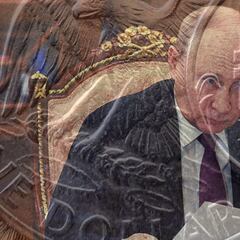Can the Russian economic crisis and sanctions affect the US living cost?
The withering sanctions imposed on Russia are having a ripple effect around the world, exacerbating the cost of living crisis in the United States.


Russia has been under sanctions for more than three weeks after their botched invasion of Ukraine. Videos have emerged of desperate Russians scrambling for packets of sugar, as commodities that feel like basics for many have become the latest battleground for a government intent on war.
In Russia sanctions are beginning to bite. The supermarket next to Valentina’s Kiosk is restricting the purchase of certain items to prevent panic buying. #ValentinasKiosk Series 2 Episode 6 @BBCNews @BBCWorld @bbcworldservice @BBCRadio4 pic.twitter.com/hRS8RJiFYF
— Steve Rosenberg (@BBCSteveR) March 20, 2022
The sanctions are there to force the Russian government to back own, or at least come to the negotiating table. There has reportedly been good progress in talks between Russia and Ukraine in the last week, but large differences still remain between the two parties.
In the meantime, sanctions will continue to bite, and bombs will continue to drop. Sanctions work both ways, so while the Russian populace is fighting over an ever decreasing supply of goods, the nations that have imposed the sanctions have their own problems. Increases in the price of oil, gas, and electricity are stinging the wallets of those in the west. But these unintended consequences are the tip of the iceberg of the effects that are rippling around the world.
Related stories:
- Will Biden go to Russia and Ukraine on his European trip?
- Could UK government now target Manchester City owner?
- Who will President Biden meet on his trip to Europe?
- What are the consequences if Russia does not pay its bonds on time?
What are some of the sanctions Russia are under?
So far, sanctions against Russia include freezing central bank assets, as well as the disconnection of Russian banking from vital components like Visa and Mastercard. This has left people unable to withdraw money, and the run on the banks from the first week of the has led to spiralling inflation with people unable to withdraw foreign currency.
However, there has yet to be a full ban on Russian oil and gas largely due to European reliance on such fuels to power their countries. The European Union bloc relies on importing 40 percent of its natural gas from Russia. Immediately cutting this off would send already sky-high prices to incredible, and intolerable, levels.
The unprecedented sanctions and export controls the U.S. and over 30 countries have imposed on Russia are taking their toll.
— The White House (@WhiteHouse) March 11, 2022
Today:
-The ruble is worth less than a penny
-The Russian stock market is closed for the longest time ever
-Russia’s credit rating is now “junk” status
What this means in real terms is a driving up of prices across Russia. According to Moscow Today, an independent Russian newspaper, inflation has increased over four percent in just four weeks. For comparison, the Central Bank of Russia aims to keep inflation under four percent each year. That target has already and will continue to be broken.
There is no guarantee the sanctions will have the desired effect. In recent examples of Iran and Cuba, economies do adjust to sanctions over time.
How will this affect the US?
The fallout from the Russian sanctions is being most felt in the price of energy. The US has banned the import of Russian crude oil, removing 7 percent of their imports last year in one swipe. If crude oil, and therefore gasoline, has a high price, then everything is affected. All routes of trade and supply are at some point impacted by the price of crude. The price of fuel is still rising, despite the cost of oil dropping in the last week, so it might not be the sanctions as the sole reason behind high prices.
Before the invasion, the US was seeing year-on-year inflation of over 7 percent, the highest in 40 years. The sanctions have exacerbated this, but didn't cause it.
Related stories
But while the cost of goods is increasing in the US, this consequence pales in comparison to the effect on Ukrainians under bombardment, or for those countries which desperately rely upon Ukrainian and Russian exports to just survive.There are around fifty countries that import more than thirty percent of their wheat from the two nations. Egypt, for example, imports 80 percent of its wheat; the very real prospect of not receiving such a wealth of food will force many to hunger, if not starvation.
“Global food chains demand global solidarity in times of crisis,” said Lama Fakih, executive Middle East and North Africa director at Human Rights Watch. “Without concerted action to address the supply and affordability of food, the conflict in Ukraine risks deepening the world’s food crisis, particularly in the Middle East and North Africa.”

